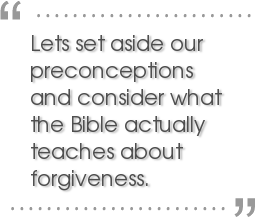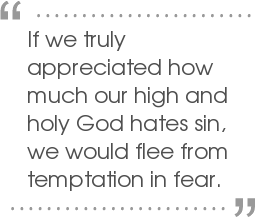The Power of Hatred

Very few Christians have developed a theology of hatred. The reason is obvious: we try to avoid hating others as best we can, and we feel the pain when others hate us. So we try to turn our minds to other things.
On September 11, 2001, American Christians—like the rest of the country—were forced to confront the power of hatred. We realized that hatred toward us was so strong that men gave their lives to harm us. And they did.
The relationship between hatred and insanity seems clear. In Isaiah 14:12-15, when Lucifer, the “Star of the Morning” envied God’s position, he was filled with defiance and determined that he would be God. During the future tribulation, the antichrist will be consumed by hatred as he makes war against God’s elect (Rev. 13:5-8). He will be so full of himself that he will enter the temple and declare himself to be God (2 Thess. 2:4). Whether hatred drives people insane or insanity drives people toward hatred, is hard to say. It may well be sometimes be one way, sometimes the other.
Haman offers us a case study in hatred. In Esther 3:1-4:3, we see his plan to exterminate the Jews through genocide. Haman became the Grand Vizier, and the power went to his head. He could not amass enough strokes or attention. People bowed down to him—not just to respect him—but also to worship the king through him. The king was thought to be the incarnation of the god Orormasdes, and Haman therefore was connected to the divine, in his view.
Discussion
Botanical Beauties and Bible Basics

Having tried my trowel in a modest 3- by 4-foot plot surrounding our mailbox, I felt primed to take on a more sizable project. So, in a spurt of gleeful ambition, my husband and I declared war on the 100-plus feet of backyard over-brush, hoping to cultivate a small ridge for our first “real” flowerbed. Easy enough—or so this city girl thought. Eager as we get about first time yard endeavors, the road of “trial and error” has been well-worn. I am, however, pleased that the tidbits of horticultural knowledge acquired have delivered more than a greener thumb. Almost embarrassed to pen the obvious, three gardening fundamentals have captured my interest because of their striking correlation to spiritual realities. Humbled and enlightened, please bear with the amateur lingo.
Basic Fact #1: Neglected soil is hard to hoe.
From what I hear, our backyard flowerbeds were once flourishing with a variety of botanical beauties, each one carefully chosen for continual blossoms throughout the summer. Needless to say, hours of back-breaking work digging up bulbs and bushes confirmed the hearsay. Uprooting established plants or nature’s sporadic foliage is no sissy’s job. And just when you turn your back, more late-bloomers make their appearance, summoning another evening of labor. In comparison, our spiritual “garden” is already speckled with unattended, undesirable “foliage” that becomes more firmly rooted with each sinful indulgence. Hoeing up bad habits and weeding out pet sins will be a life-long, arduous process. Often, the discovery of what lay beneath the surface is daunting as you uncover what seems like an impossible extraction. Plopping pretty little seeds atop an underground “beast” will not suffice. Only those surrendered to hard work, in cooperation with the Holy Spirit, will cultivate adequate soil, well-groomed for lasting spiritual growth.
Discussion
Should Forgiveness be "Unconditional"?
 The forgiveness controversy
The forgiveness controversy
Back in 1999, I preached a series on the subject of forgiveness. Many folks in our congregation had never heard the approach I took. A number commented that they heard Christian leaders on the radio or in magazines take the opposite position during the weekdays between my sermons.
The world and much of evangelicalism believe that we should forgive unconditionally. Secular psychologists and popular preachers have formed an alliance that intimidates many of us from even considering the alternatives. Yet many Bible teachers believe that forgiveness is conditioned upon repentance. I am in the latter group.
Bible-believing Christians agree that we are to forgive others as God forgives us. If you believe God forgives unconditionally, this would logically lead you to Universalism, the belief that everyone is saved; no one is under the wrath of God because God’s wrath is not directed toward those who are forgiven. If God forgives unconditionally, then none are unforgiven. Most evangelicals recognize that multitudes are lost, yet many say that God forgives unconditionally. Do you see the contradiction here?
Discussion
Toward a Theology of Facebook

“Excuse me, your status is showing.”
It happened the day my mother “friended” me on Facebook. That’s when I knew the world had changed.
Up to that point, Facebook had been simply yet another social media site I visited, a place to reconnect with long-lost college roommates, take ridiculously time-consuming quizzes to discover my hidden self (for what it’s worth, I’m a perceiving extrovert who enjoys reading and long walks on the beach), and check in on my high school classmates without actually having to attend the reunion. It was all very much a virtual party, complete with virtual cake, virtual drinks, virtual decorations, and virtual gifts.
That is, until my mother showed up.
Suddenly the event was no longer a select meet-and-greet, a party by invitation only. No, somehow, the gathering had grown, moved outdoors, and was happening in the streets. It was a community block party and everyone was invited. Including my mother.
That’s when I realized that my virtual world and my real world had collided. More to the point, that was the moment that I realized that the virtual world, that Facebook, was the real world. And that what I had been using as a form of escapism was simply another level of interaction with very real coworkers, friends, neighbors, and in this case, relatives. In a word, Facebook was community.
As such, it was going to get pretty messy.
Discussion
Why Christians Sin: a Failure of Fear, a Failure of Love

It is an all-too familiar story. A pastor was forced to resign from the church when his affair with a staff member came to light. Another church was devastated. Another set of believers, both young and old, was left to wonder what had happened to the man they had loved and followed—a man who had led many of them to the Lord, baptized their children, conducted their weddings, visited them in hospital and prayed with them for their needs. There was no question of his guilt; the actions were admitted and indefensible. But many longed for an explanation. Why did it happen? How did it happen?
The temptations to sin that we face are as numerous and varied as devilish ingenuity and human depravity can conspire to concoct. And after the fact, the explanations, rationalizations and excuses are as varied and numerous as those sins. But if we take the Scripture seriously when it promises that along with each temptation comes “a way to escape” (1 Cor. 10:13), each sin indicates a failure on our part. I believe that, in the final analysis, all sins spring from twin failures—a failure of fear and a failure of love.
“By mercy and truth iniquity is purged, and by the fear of the Lord men depart from evil” (Prov. 16:6).
Discussion
Joy: Worth Hanging On To
 The Book of Philippians is one of the most positive books in Scripture. Its theme is joy. One of the best books on Philippians at a popular level is the one penned by Dr.
The Book of Philippians is one of the most positive books in Scripture. Its theme is joy. One of the best books on Philippians at a popular level is the one penned by Dr.
Discussion
Lessons from the Summer Quiet

Though Phoenix can get too hot, my family and I enjoy the summer months for several reasons. My wife Toni takes June and July off of piano teaching to spend some extra time with her husband (me) and our sons. During those two months I take the bulk of my vacation time so we can have some special times together. All of us are “crazy busy” during the majority of the school year. My sons are also involved in school, church, sports, music, etc. So when the end of school comes around, they are as needy of a break as Toni and I are.
Often on our trips, I get to preach at a sister church, and the rest of the family play instruments or sing. Then we try to enjoy some sights and fun times as a family. Because we live in the desert, we love the beach—especially when the temperature is around 60 and the ocean is cold. We’re the weird family picking up sea shells, making sand castles and sticking our feet in the Pacific when nobody—and I mean nobody—is on the sand.
Though traveling together can sometimes be stressful, these family times are a break and a blessing to me personally. I love these times. I’m trying to hold onto the memories. Before long the boys will be off making their own way. Second to my salvation and my wife, my sons will always be the most special gift God has granted to me. Before our marriage, my heart’s desire was three sons. Amazingly, God gave us three sons.
Discussion
Humanism's Delusional Dream?

A Humanist Manifesto was signed by thirty-four men in 1933. Scorning any notions of religion based on divine revelation, the signatories cast vision and set guidelines to achieve peace and goodwill on earth through enlightened human effort. Six years later, the world’s superpowers tumbled headlong into a catastrophic World War. Millions were slaughtered.

Discussion